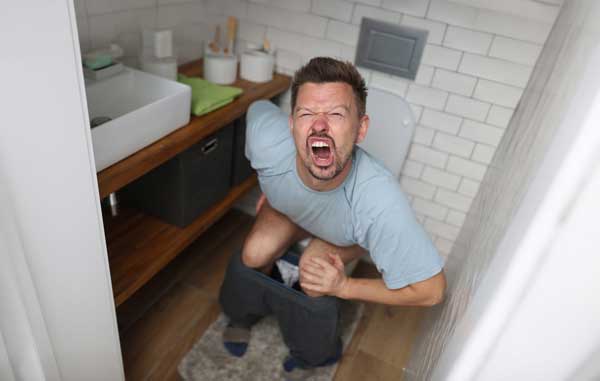In this blog post, we will delve into a pressing question raised by one of our subscribers – “Gut doctor, I’ve noticed some bright red blood in my stools. Is this just hemorrhoids, and do I need to do anything about it?” Hematochezia, the presence of bright red blood in the stool, can be alarming. We will explore the causes, evaluation, and treatment options for this condition. Let’s get started.

1. What is Hematochezia?
Hematochezia is a medical term for the passage of bright red blood in the stools. It’s a common occurrence, affecting around 10 percent of adults. In most cases, people might not report it, but if you do, it’s essential to seek medical advice. This warrants further assessment.
2. Initial Assessment and Resuscitation
Upon seeking medical evaluation, your overall health and vital signs will be assessed. If there are signs of shock, immediate measures will be taken, including blood tests and administering fluids. Your medical history will be critical, including questions about the frequency and color of blood, any medications like blood thinners, and any abdominal or pelvic pain.
3. The Role of Digital Rectal Examination
A digital rectal examination is crucial as it can confirm the presence of blood in stools. It can also help identify causes such as anal fissures or external hemorrhoids. Any rectal masses found should prompt concern.
4. Diagnostic Tests
A colonoscopy is a vital diagnostic test. It involves a flexible tube passed through the back passage to examine the colon’s end. In most cases, it can confirm the source of bleeding. If not, other tests like imaging studies or capsule endoscopy may be required.

5. Common Causes of Hematochezia
Most cases of hematochezia are due to benign causes, such as hemorrhoids or diverticular disease, which involves bleeding from blood vessels in the colon’s pouches. Diverticular disease becomes more prevalent as you age.
6. Treatment and Prevention
The treatment approach varies based on the cause. For hemorrhoids, dietary fiber can help reduce bleeding. Heat therapy may be used for bleeding caused by blood vessels in the colon, while tumors can be surgically removed. In cases of inflammatory bowel disease, medications can help stop bleeding.
Conclusion
To answer our subscriber’s question: if you have bright red blood in your stools, it’s crucial to visit your local doctor for an assessment. Hematochezia always warrants further evaluation. Most cases have benign causes, and in many instances, the bleeding will resolve on its own. If you’re experiencing rectal bleeding, remember to seek medical advice.
